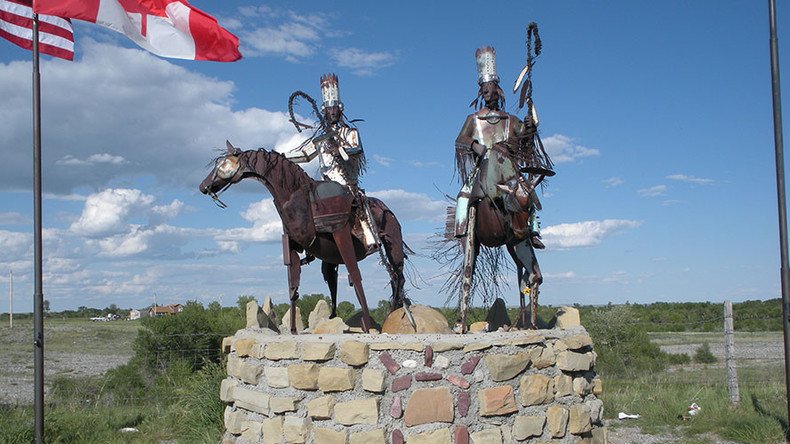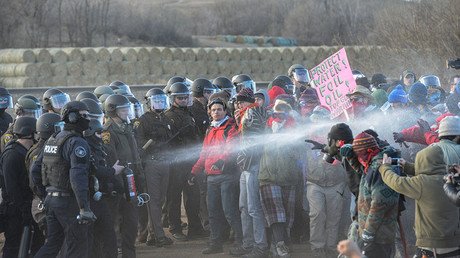What about DAPL? Obama administration cancels oil & gas lease on native land in Montana

The Blackfoot are breathing a sigh of relief as the federal government canceled oil and gas exploration on sacred land bordering their reservation in Montana. Nationwide protests are pressuring Washington to do the same with the Dakota Access Pipeline.
The Interior Department announced Wednesday that it had reached a settlement with Devon Energy to cancel the lease to drill for oil and gas on land held sacred by the Niitsitapi (“Blackfoot”) Tribe. The Bureau of Land Management (BLM) has canceled Devon’s leases in the Badger-Two Medicine area of the Lewis and Clark National Forest in northwestern Montana.
“This is the right action to take on behalf of current and future generations,” Interior Secretary Sally Jewell said in a statement. The settlement would protect the area’s “rich cultural and natural resources and recognizes the irreparable impacts that oil and gas development would have on them.”
Historic day for Blackfeet Nation–sacred tribal land protected from oil/gas dev thx to govt, industry agreement.SJ https://t.co/xs2rrbujV3pic.twitter.com/DzSon1uZVn
— Sally Jewell (@SecretaryJewell) November 16, 2016
The Badger-Two Medicine area is part of the Lewis and Clark National Forest in northwestern Montana, covering 130,000 acres bordering on the Blackfoot reservation, as well as the Bob Marshall Wilderness and Glacier National Park.
“There are special places in this world where we just shouldn’t drill, and the Badger-Two Medicine is one of those places,” said Senator Jon Tester (D-Montana). “This region carries great cultural and historical significance to the Blackfeet Tribe and today’s announcement will ensure that the Badger-Two Medicine will remain pristine for both the Tribe and the folks who love to hunt, hike, and fish near Glacier Park and the Bob Marshall Wilderness.”
The area is home to grizzly bears, elk, wolves and other wildlife, according to Michael Jamison, senior program manager at the National Parks Conservation Association. “There aren’t many places like this left in the lower 48,” Jamison said. “It is a tremendously important ecosystem.”
The issue dates back to the 1980s, when the Reagan administration granted oil and gas exploration leases in the area for as little as $1 per acre. Critics have accused the government of failing to consult with Native American tribes, conduct environmental impact evaluations or review the cultural value of the land. In 1997, the US Forest Service placed a moratorium on any new oil and gas exploration in the region, leaving the leaseholders in legal limbo. Congress removed the area from mineral development in 2006.
The Obama administration has been seeking to wrap up any outstanding lawsuits over land management pertaining to Native American tribes. At the end of September, the Interior Department announced settlements with 17 tribes, worth nearly $500 million, over mismanagement of tribal lands.
Meanwhile, Native American and environmental activists organized a day of action Tuesday, protesting across the US against the Dakota Access Pipeline (DAPL), currently under construction in North Dakota.
If completed, the 1,172-mile pipeline would carry crude oil from Bakken oilfields in North Dakota to Illinois. Its route would take it through sacred burial grounds and under the lake that is the principal source of water for the Standing Rock Tribe of the Oceti Sakowin (“Sioux”).
On Tuesday, the Army Corps of Engineers informed the Standing Rock Tribe and the corporations behind the pipeline that “additional discussion and analysis are warranted” about the government granting an easement for construction on federal land, “in light of the history of the Great Sioux Nation’s dispossessions of lands, the importance of Lake Oahe to the Tribe” and the relationship between the US government and the Standing Rock Nation.
“While these discussions are ongoing, construction on or under Corps land bordering Lake Oahe cannot occur because the Army has not made a final decision on whether to grant an easement,” the Interior Department said in a statement.
While the Army Corps of Engineers has suspended work on the pipeline on federal land pending further review, private companies have continued building. Corporate security and police have clashed with protesters trying to block the construction.













